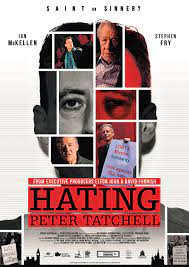
HATING PETER TATCHEL
Australia/UK, 2021, 95 minutes, Colour.
Directed by Christopher Amos.
From the 1970s, Peter Tatchel was a controversial activist, establishing the organisation Outrage, a campaigner and crusader for LGBTQI+ rights. Not only was he a crusader, he was an active activist, protesting, in the public eye, promoting his cause.
Some commentators who enjoyed this documentary suggest it should be called Loving Peter Tatchel. And, there were many who did – and who will after seeing this favourable documentary though with an emphasis on warts and all. But, there have been many who hated him over the decades and will continue. However, the film vividly brings to mind the changes in attitudes over the 50 years that Peter Tatchell was active, from legislation against homosexual activity, from prejudice stances, to changes in public attitudes in many countries, to legislation on same-sex marriage. There has been considerable change. At the end of the film, there is a quite long list of the many countries with prohibitive legislation.
Some people might be surprised to find that Peter Tatchel is Australian, from Melbourne. There are photos and home movies from the period. His mother was a devout Christian, not approving homosexual orientation or activity. However, she is interviewed throughout the film, especially conversations with Peter, his tough-minded sister, and a mellowing in his mother’s attitude and her love for her son. But, his stepfather is seen as a cruel man, violent.
Like many Australian expatriates, Peter Tatchell moved to London and settled there. We see him at home, moving around London, at meetings of Outrage…
The framework of the film is a conversation he has with Ian McKellen (looking a bit like a scruffy Gandalf), but asking the personal questions, some moments of his being critical, but very sympathetic to Peter and his causes. There are other sympathetic interviews, especially with Stephen Fry.
Older audiences may remember news footage of Peter Tatchel’s protests and demonstrations, his placards, his standing in public view, the reaction of the police, several times being manhandled and his being hit (and his later saying that doctors have warned him against any more head injuries because of the effect on his brain). We see him in London. We see him in Russia. He denounces Putin – and, in 2018, went with a camera crew to Moscow again at the time of the World Cup. Stephen Fry notes that Peter Tatchel is expert at performance, and knows camera angles and lighting so that he gets the best effect for the interviews, the treatment he experiences, the role of the police. This is especially the case in his encounter with Robert Mugabe, wanting to make a citizen’s arrest in London, the episode shown twice, especially the physical brutality towards him.
So, the film is interesting for those who want to understand Peter Tatchel, for those who remember him. And, for those who don’t agree with him or his tactics, a reminder. This is symbolised especially by his demonstration against Archbishop George Carey iin Canterbury Cathedral, invading the pulpit during an Easter Sunday sermon, holding up denunciatory placards, indicating a number of Anglican bishops with homosexual orientation. George Carey was interviewed at the time, disapproving of the bullying tactics. However, he is again interviewed, 20 years later, not agreeing with all the tactics but indicating the good that Tatchel has done in raising consciousness – and even making a connection with the activity of Jesus himself and his social stirring.
The film is an Australian/BBC production, with finance from Screen Australia and various state screen organisations.